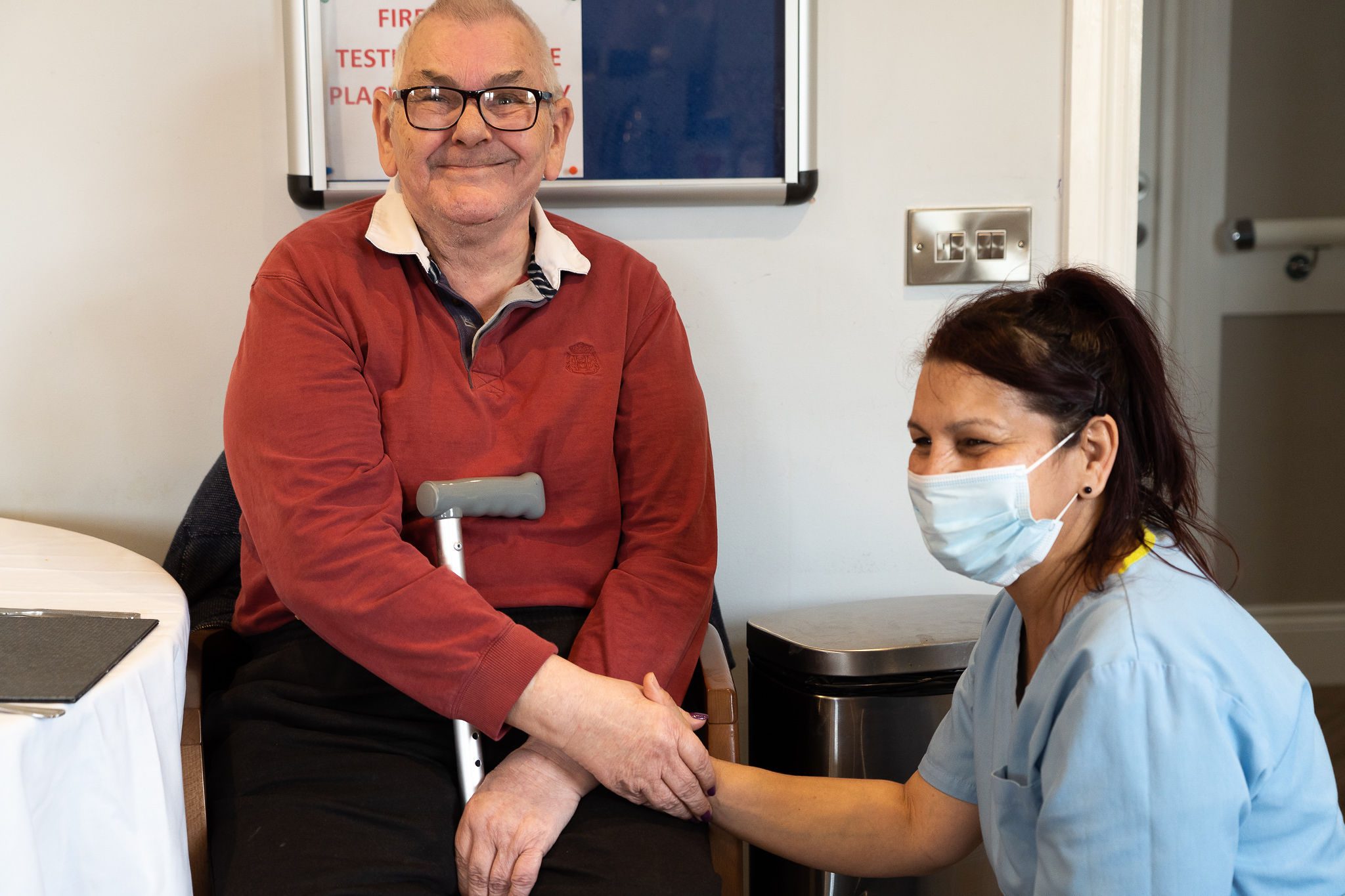Mr B, an 86-year-old married man with vascular dementia, was transferred to Aranlaw House from hospital after experiencing a fall in another care home. The previous care home had difficulty managing Mr B’s level of night-time wakefulness, particularly his tendency to walk around for extended periods (sometimes hours).
In response, they increased his night-time sedation, which made him excessively drowsy, worsened his disorientation, and did not diminish his determination to get out of bed and look for his wife.
Mr B’s wife had previously arranged for him to be admitted to a care home due to her own health problems and was highly anxious about how we would handle his wakefulness at night. With her help, we gained a comprehensive life history for Mr B, allowing us to understand that his behaviours were a result of his belief that he was still working.
Upon arriving at Aranlaw, it was immediately evident that Mr B was confused and disoriented, unaware of his surroundings and the reason for being there. To engage him, we made use of the life history information provided by his wife.
Despite Mr B’s poor mobility, and after consulting with Mrs B, Mr B’s GP, and a Community Mental Health Nurse, we decided not to administer the night sedation that he had been previously prescribed in respite care. Instead, we closely monitored him using a pressure mat by his bed to alert staff when he got up. This was not to restrict his movement, but to discreetly monitor him while he walked freely around the home.
Mr B is currently in Stage 2 of dementia. At this stage, he relies on emotional memories rather than factual ones to understand his surroundings. He is often disoriented in time and place and may believe he is at work or in a hotel. Mr B struggles to recall nouns and may have difficulty following a train of thought or completing sentences. At this stage, individuals with dementia do not have the cognitive ability to conceal their memory difficulties.
Initially, Mr B exhibited several behaviours consistent with feeling lost and fearful at Stage 2 of his dementia. He would constantly search for his wife, becoming frantic even if she left his side for a brief moment. Getting lost was a common occurrence for Mr B, and he would often struggle to locate his own room. Mr B’s frustration grew whenever staff intervened in his efforts to follow his wife outside the building, and he would frequently come to the office to express his concerns about how he was going to pay for his care. He also became increasingly anxious about losing personal items, such as his glasses, comb, and toothbrush, which he would often carry with him and then forget where he had placed them.
To help Mr B feel more at ease and engaged, the staff at Aranlaw House tried to connect with him on a personal level. Recognising that Mr B’s emotional memories were more intact than his factual memories, they asked him about his work and colleagues and showed interest in his professional expertise. When Mr B expressed concerns about financial matters or communication with his colleagues, staff offered to help him write letters or make phone calls.
At the same time, staff were sensitive to Mr B’s fears and anxieties, acknowledging his anger or distress and listening to him when he expressed his worries or frustrations. They also found that providing him with a daily newspaper helped him feel more relaxed and stimulated. To further support him, staff used nonverbal communication such as eye contact and gentle touches on his arm to show empathy and reassurance. Overall, these efforts helped Mr B to feel more understood and valued, and to gradually adjust to his new environment at Aranlaw House.
Over time, Mr B’s anxiety and fearfulness decreased, and he began to feel more comfortable and secure in his new surroundings. He started to participate in the daily routines and activities at the home and found a favourite places to sit. Mr B also enjoyed spending time with the staff and would often tease them or give compliments. We did not have to increase his night sedation as he slept well for the first part of the night and only woke up if he was worried about something related to his work. As he trusted us more, we were able to address his concerns and come up with solutions together, such as dealing with things in the morning or writing a letter to be typed up the next day.
Mr B remains a resident at Aranlaw and has continued to progress positively. On some days, he expresses a desire to retire and take things more slowly, while on other days, he seeks out the managers to discuss the figures he believes are related to his ongoing work with mergers. To facilitate his needs, we schedule meeting times with him and go to his room at the agreed time to take notes. Despite his memory difficulties, Mr B remains friendly and engaged, always looking for an opportunity to tease staff or pay a compliment to the carers. We continue to monitor him closely, ensuring that he feels safe and comfortable in his surroundings.





















